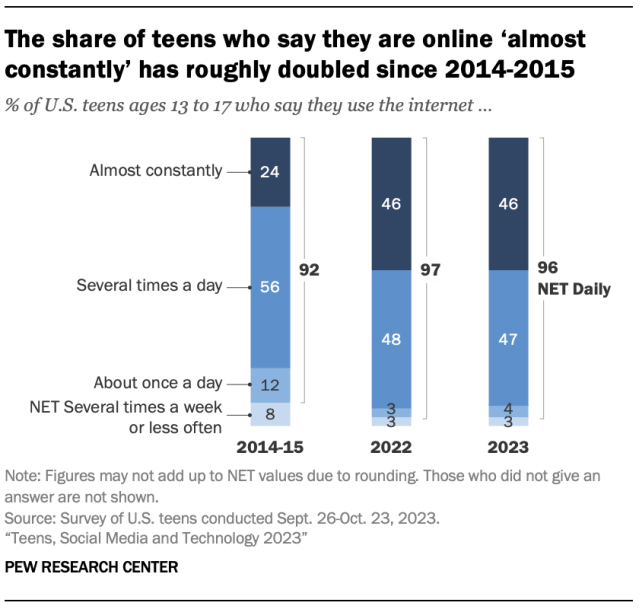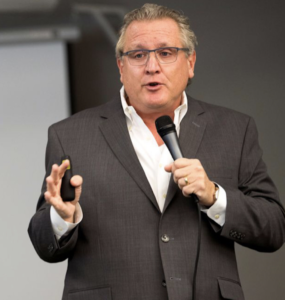
social media addiction
Many times in my career, I’ve used a variation of this phrase: “I want this (product / content / service) to be so good people are addicted to it!”
In a way, that’s the ultimate dream. Sergio Zyman, ex-CMO for Coca-Cola, used to tell me the goal of marketing was to “sell more stuff, to more people, more often, for more money.”
The idea of being addicted to what you sell seems like an elegant goal that would make you strive to be the best at everything you do, especially when it comes to social media marketing.
Here’s the business case for social media platform success: Create a recommendation engine that delivers content so insanely relevant that people spend increasing amounts of time on the site. Use that engagement to collect personal information on preferences that lead to highly targeted ads.
In other words, create social media addiction … at all costs. Create addiction. That’s social media marketing success.
Here’s the problem. It’s working. And if you work in marketing, you’re probably playing a role in the global mental health crisis.
The algorithms win
A recent Gallup survey revealed significant insights into U.S. teenagers’ social media habits. More than 51% of teens spend an average of 4.8 hours daily on social platforms. Age and gender differences are evident: 13-year-olds average 4.1 hours, 17-year-olds reach 5.8 hours, and girls spend nearly an hour more than boys.
YouTube and TikTok are the dominant platforms, with usage times of 1.9 and 1.5 hours daily, respectively, while Instagram lags behind at 0.9 hours.
Adolescents with lower levels of self-control spend about 1.2 hours more on social media than their more conscientious counterparts. Those with strict parental screen time rules report 1.8 hours less time online.
Unsurprisingly, insights from the survey suggest that design strategies by tech companies that encourage prolonged use are working.
Should we be concerned? Here’s what Gallup had to say (slightly edited for brevity):
Amid declining teen mental health, many scholars have carefully investigated the role of social media. Studies have pointed out how technology companies manipulate users into spending more time on the apps through their designs. There is hard evidence to support this view. In a 2022 article published in the journal American Economic Review, economists reported the results of an experiment with young adults designed to affect their social media use; they conclude that 31% of time spent on social media stems from what the researchers describe as “self-control problems.”
Consistent with the literature on “social media addiction,” these data show that teens who spend more time on social media rate themselves as being less conscientious more generally and live with parents who are less likely to restrict screen time. This analysis reveals that these characteristics also predict poor mental health — and seem to explain at least some of the observed relationship between social media use and mental health problems.
The marketer’s responsibility

These addictive and compulsive behaviors are troubling. But even more disturbing is how the largest corporations in the world are investing billions in promoting and accelerating this compulsive use of their tech tools.
If you look at the 10 largest companies in the world, half of them are trying to create this addictive relationship to technology. The days when the dealer in addiction had to hide in the shadows are over. They now operate freely in your home, and every other sphere of your life.
I am sincerely conflicted by marketing’s role in this mess.
We absolutely have a responsibility to our customers. We need to cut through the noise and ideally earn more attention than competitors. We have this amazing tool at our disposal — social media algorithms — especially if your target market includes teens who live their lives online.
But isn’t there a higher goal? Do No Harm.
Incrementally, my individual marketing efforts won’t have any meaningful impact on social media addiction and the world’s mental health. In all good conscience, I can say that I’m not personally causing any problems.
But when every social media marketer is creating addiction and profiting from it, the cumulative effort is the root of the global problem. In fact, marketers are the entire problem because the purpose of creating addiction is to sell more stuff to more people, more often, for more money. Sergio would be overjoyed!
Social media addiction. What’s next?
The other day, I littered. It was a bad choice, but I had a dirty, wet napkin in the car and I was miles away from a service station. Out the window it went. Perhaps this is the first time I’ve littered in my life. So despite my poor choice, the impact on the global pollution problem is near zero. Heck, the darn thing is biodegradable, right?
But if everybody littered like that, we would create an environmental disaster. And that’s where we are with marketing and social media. No individual TikTok ad hurts anything. But when it’s a way of life for millions of marketers reaching billions of people, it’s a disaster.
I can make a pledge to not pollute anymore through litter. It’s easy. No personal impact. But making a pledge to not market on social media is existential. With our advertising “litter,” many marketers no longer have a career.
Let this sink in: Social media marketing is directly contributing to social media addiction and the global mental health crisis. Perhaps YOU are directly contributing to the mental health crisis.
I thnk deep down we know this … but we never talk about it. Social media expert Arik Hansen said, “Some days I feel like I work for Big Tobacco.”
Anna Bravington, a UK marketing strategist, had this perspective: “Social media addiction and marketing is such an interesting dilemma, and balancing act. I think your thoughts in Belonging to the Brand about community seem like the best middle ground. In community, time spent online is quality and human, not artificial and forced. It feels like that approach is less addictive, and given the mental health side, the right community can be an asset rather than a burden.
I have no universal answer for this, but I needed to start a conversation about it. We can’t keep looking the other way.
 Mark Schaefer is the executive director of Schaefer Marketing Solutions. He is the author of some of the world’s bestselling marketing books and is an acclaimed keynote speaker, college educator, and business consultant. The Marketing Companion podcast is among the top business podcasts in the world. Contact Mark to have him speak at your company event or conference soon.
Mark Schaefer is the executive director of Schaefer Marketing Solutions. He is the author of some of the world’s bestselling marketing books and is an acclaimed keynote speaker, college educator, and business consultant. The Marketing Companion podcast is among the top business podcasts in the world. Contact Mark to have him speak at your company event or conference soon.
Follow Mark on Twitter, LinkedIn, YouTube, and Instagram.
Illustration courtesy MidJourney


